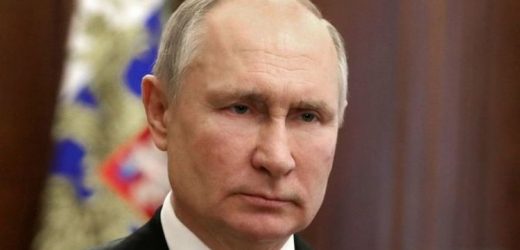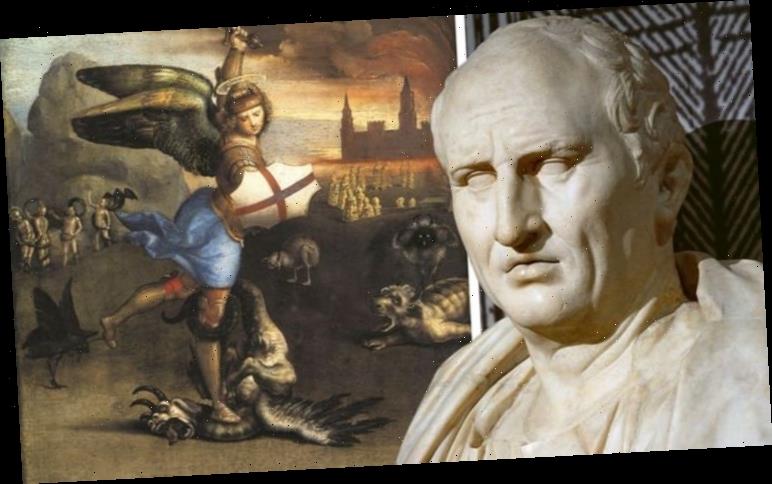Vladimir Putin ‘will eventually be forced out’ says expert
When you subscribe we will use the information you provide to send you these newsletters.Sometimes they’ll include recommendations for other related newsletters or services we offer.Our Privacy Notice explains more about how we use your data, and your rights.You can unsubscribe at any time.
The Russian president’s comments came after the EU agreed to sanction those responsible for the “arrest, sentencing and persecution” of Mr Navalny. Analysts have said relations between Russia and the West are approaching their lowest point since the Cold War.
President Putin spoke to the Federal Security Services (FSB) in an annual address on Wednesday.
He said the West is “trying to shackle us with economic and other sanctions”.
Mr Putin added: “We are faced with the so-called policy of containing Russia.
“This is not about competition… but about a consistent and very aggressive line aimed at disrupting our development, slowing it down, creating problems along our borders.”
The Russian president claimed the West is employing tools “from the arsenal of the special services”.
He added that efforts were aimed at “provoking internal instability to undermine the values that unite Russian society and ultimately weaken Russia and bring it under external control”.
Earlier this month, Mr Putin accused Western countries of using Mr Navalny to attempt to contain Russia.
According to analysts, the term connotes the US strategy towards the Soviet Union during the Cold War.
In his speech to the FSB, he urged the domestic intelligence agency to make the Western threat a priority in its work this year as well as countering terrorism.
He said: “The suppression of any attempts from the outside to usurp the right of the people of Russia to determine their future should also be in your field of attention.”
Mr Navalny was almost killed in a nerve agent attack last year. The Kremlin has denied any involvement in this.
He is currently serving a prison sentence which has widely been viewed as punishment for his opposition activism and investigations into the corrupt lives of Russia’s rich and powerful.
Commenting on the matter, Foreign Secretary Dominic Raab said: “It is appalling that Alexey Navalny, the victim of a despicable crime, has been detained by Russian authorities.
“He must be immediately released. Rather than persecuting Mr Navalny Russia should explain how a chemical weapon came to be used on Russian soil.”
Former US secretary of state Mike Pompeo said he was “deeply troubled” by Mr Navalny’s arrest.
Mr Pompeo added: “Confident political leaders do not fear competing voices, nor see the need to commit violence against or wrongfully detain political opponents.”
DON’T MISS
Navalny’s Western connections could create tension within Moscow [UPDATE]
We live in age of tyranny, democracy is failing us – FREDERICK FORSYTH [COMMENT]
Joe Biden to send nuclear jets near Russia in fiery warning to Putin [INSIGHT]
The 44-year-old blogger returned to Moscow in January after recovering from the nerve agent attack and was immediately arrested.
His arrest triggered mass protests across Russia by his supporters.
The Kremlin critic has accused Mr Putin of “sucking the blood out of Russia” and claims his party is full of “crooks and thieves”.
Mr Navalny’s court case was based on his failure to report regularly to police in 2020 under the terms of a suspended sentence for fraud.
However, Mr Navalny’s legal team argued that authorities knew full well that he was receiving emergency treatment after the nerve agent attack and was in a coma for part of the time.
In 2016, the European Court of Human Rights condemned Mr Navalny’s 2014 fraud conviction as a violation of human rights and ordered Russia to pay him compensation.
However, the Russian Supreme Court later upheld the conviction.
Josep Borrell, the EU’s high representative for foreign affairs, said all the EU’s member states have agreed to impose restrictive measures on those responsible for Mr Navalny’s persecution under the bloc’s so-called Magnitsky act.
Mr Borrell said there was an agreement that Russia was becoming an authoritarian state which was “driving away from Europe”.
He added: “In response to events around the situation of Mr Navalny we reached a political agreement to impose restrictive measures against those responsible for his arrest, and sentencing and persecution, and in doing that, for the first time ever, we will make use of the European Union global human rights regime to this end.”
Source: Read Full Article







